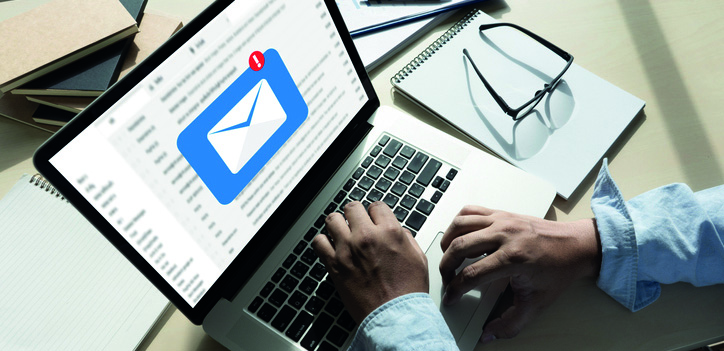Getting on top of unproductive email habits can take a year's hard graft
By: Communications

Employees can eradicate unhelpful work email habits that stifle productivity and harm personal wellbeing - but it takes a particular self-belief and the will to put in a concerted effort, according to a new study involving the University of East Anglia.
The research details how unproductive work email habits can be eradicated through a structured programme of behaviour change in a 12-month study.
Led by the by the University of Sussex Business School and featuring academics from UEA and Loughborough, the study identifies employees with high levels of self-belief as best able to curb unhelpful work-email habits.
They recommend employers consider offering self-efficacy training for their staff before attempting to eradicate unwanted work email behaviour from their organisation.
Prof Kevin Daniels, from UEA’s Norwich Business School, said: “Bad work-email habits can be difficult to overcome because change requires a clear rationale in terms of improving goal attainment and wellbeing.
“Work email habits are also difficult to eradicate because they are triggered by work-relevant cues, and often by the actions of others.
“It can be difficult to classify email habits as universally unhealthy or unproductive, compared to lifestyle habits associated with bad diet or insufficient exercise,” he added.
Key findings:
• Workers need to regularly engage with rationalised plans of action and state their intention to use these, in order to change work-email habits.
• Organisations should consider training workers to enhance their self-efficacy prior to implementing a work-email habit change intervention.
• Providing regular feedback about the impact of work-email habit change on well-being and goal attainment is likely to make the change sustainable in the long-term.
Prof Daniels said: “Action plans might include recommendations on how to respond to a work-email cue such as turning off email notifications, or only checking email at predefined times during the day.
“Such an approach would allow individuals to recognise a new purpose to their activity, such as improving well-being or achieving task goals more effectively, and subsequently provide the cognitive switch that provokes an intention to change behaviour and achieve an individual’s goals.
“Work habits are often embedded in organisational and group systems and so it is necessary to apply an intervention over the longer term and within a supportive environment.
“Employers can help support their employees to make the necessary changes to their work email habits by offering training, providing clear plans for changing specific habits, offering timely feedback to staff on how individual performance and well-being is improving, and by encouraging all members of the organisation to engage in changing email habits at the same time.”
The research team developed a Work-habit Intervention Model (WhIM) and evaluated it by running a 12-month wait-list intervention study for workers in a UK-based international charity.
Participants were randomly allocated to either an active intervention group or to a ‘wait-list’ control group.
Action plans were provided to participants in the active intervention group on a regular basis over two four-month periods, and participants stated their intention to use each plan.
The intervention group was provided with 23 evidence-based email tips, sent every two-weeks via email from the research team which together formed rationalised action plans across four categories for improving work-email use.
The tips covered best practice for sending and receiving or checking emails, managing email systems and choosing appropriate modes of communication.
Change in work-email actions, and outcomes relating to any change were measured around four to six weeks after the end of the intervention period.
Lead author Dr Emma Russell, from the University of Sussex Business School, said: “It is important for employers and employees to remember there are not universal rules around work-email habits. They are only ‘good’ or ‘bad’ in relation to how they affect an individual’s performance and well-being, so a habit that is good for one employee, may be bad for a colleague.
“They key is for each employee to consider for themselves if the habits they have developed really help in meeting work and well-being goals. If they don’t, individuals should devise a plan for doing things differently, tell colleagues how they are working to change their habits and then observe whether repeatedly trying-out the new action is helping to meet work and well-being goals.”
‘The work-habits intervention model: A 12-month study to change work-email habits’ is published in the Journal of Occupational and Organizational Psychology.
Related Articles

Fresh evidence of ChatGPTs political bias revealed by comprehensive new study
The artificial intelligence platform ChatGPT shows a significant and systemic left-wing bias, according to a new study by the University of East Anglia (UEA).
Read more
Study reveals the increasing cost of debt caused by climate change
Climate change will increase the cost of sovereign and corporate debt worldwide according to new research led by the University of East Anglia (UEA) and the University of Cambridge.
Read more
Banning multibuy discounts drives sales rather than curbing appetites
With the government under pressure to devise policies that help curb excessive consumption of unhealthy foods and drinks, new research from the University of East Anglia (UEA) finds that banning multibuy deals has the opposite effect.
Read more